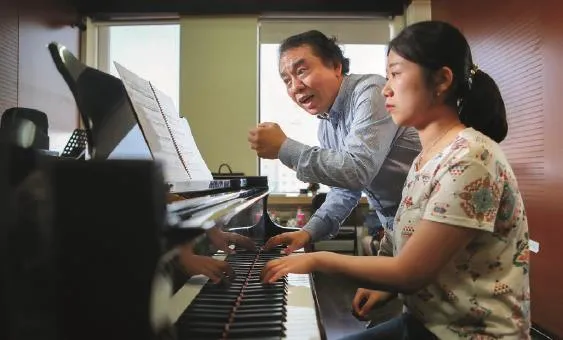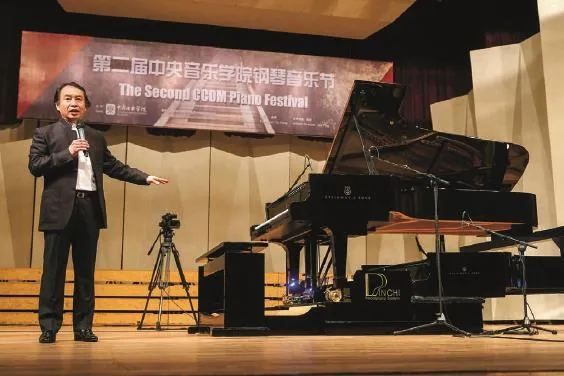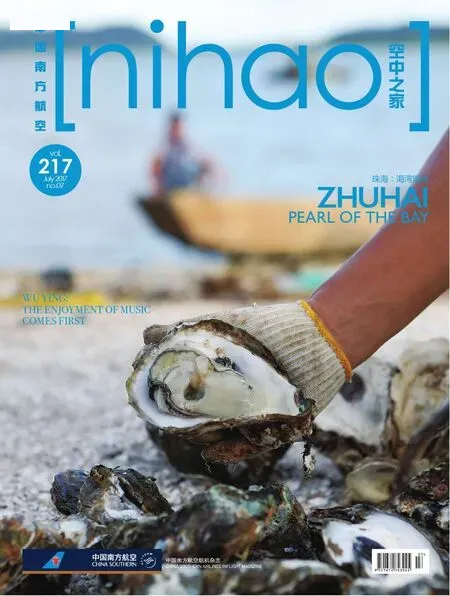吴迎享受音乐最重要
2017-07-20
吴迎享受音乐最重要
吴迎从出生那天起,便与中央音乐学院结下了不解之缘。他所出生的这个大院,曾经是清朝王府,后来被用作学院的音乐厅。这里不仅是他的出生地、母校,更是他愿意付出心血实现教育理想的地方。

In one of the classrooms of CCOM's Piano Department, Prof. Wu Ying is teaching his postgraduate student.
中央音乐学院钢琴系的其中一间教室里,吴迎正在给他的研究生学生上课。这位从事钢琴教育逾30年的钢琴家,留着贝多芬式的卷发。演奏和教学的时候,那一头卷发便似小泽征尔的指挥棒一般在空中带有韵律地晃动。他那双钢琴家的大手,时而握拳引导力量,时而舒展表示舒缓;而他那双炯炯有神的眼睛,更是时刻向学生传达着智慧和能量。这样的一对一专家课堂,无疑是一场精彩绝伦的音乐对话。
5岁那年,吴迎在作曲家父亲吴祖强、钢琴家母亲郑丽琴的指导下开始了学琴之旅。1976年从中央音乐学院毕业后,他获硕士学位后留学奥地利,师从钢琴大师巴杜拉·史科达。回到国内后,他选择返回母校执教。成长、游学、回归,吴迎的生命与中央音乐学院紧紧联结。从此,培育出顶尖的钢琴演奏家成了他最大的心愿。
国内的钢琴教育从1920年代起开始发展,近百年得到了极快的提升。然而,每年从音乐学院毕业的学生中,依然只有极少数能够最终成为职业钢琴演奏家。如果将钢琴系的学生比喻成为金字塔底部,那么成为钢琴家的只占金字塔尖的比例。
“其实国内外都是如此。古典音乐的舞台就这么大,而每年都有新人崭露头角。”吴迎说道。
国内的职业钢琴家不多,主要原因是国内古典音乐市场还未完成开拓,尚未形成成熟的演奏经纪人制度。相比流行音乐,古典音乐的听众仍处于培育阶段,因此,古典音乐的演出商也不多。在国外,有演奏经纪人的职业钢琴演奏家基本能够以自己的演奏收入生存。而国内的职业钢琴演奏家较少,大多数一边从事钢琴教学一边进行钢琴演奏。
吴迎说,职业钢琴演奏家的职业征途充满艰辛,但是从音乐中获益,每个人都能做到。
一个人在琴房里的时候,吴迎也爱弹奏起身前的钢琴,沉浸在纯粹的音乐世界里。
WU YING PROFESSIONAL PIANISTS ARE A FEW ATOP THE PYRAMID
N=NIHAO
Z=WU YING
N: Over the last decade, a piano mania has swept China, however, the emphasis is often placed on piano exams. What's your take on this?
W: I think interest should play a key role in deciding whether or not a kid should learn to play piano. There is no point in forcing a kid to do so if he or she is not interested. For those who do enjoy it and have already started learning piano, it is by no means necessary to go through graded piano exams or to aspire to become professional pianists, for it takes enormous hard work to pursue this profession. You've got to practice for long hours almost every day. So when we admire a pianist performing beautifully in the spotlight, we'd better keep in mind what he or she may have been through on the way to the stage. There is no way that one can carry on without real interest.
I can understand the mindset that Chinese parents have when they are so keen on having their children do piano exams. Though exams do help assess the level of a learner's piano skills, I feel that the whole idea of learning piano has somehow changed when many learners take grades as their sole pursuit. Kids may easily get fed up with repeating the same pieces. When they can't feel the joy of playing the piano, their interest may die. In fact, the grade is only one of a set of standards on which conservatories of music to choose candidates. After all, a happy childhood is what we all wish for our children. From an artistic point of view, we start the pursuit of any form of art with our discovery or perception of its beauty.
N: What would you like to say to learners aspiring to become professional pianists?
W: Like any other profession, the piano-playing profession has no shortcuts. You've got to do it hard and to go through many diffi culties. Anyway, who don't encounter diffi culties of one kind or another throughout his lifetime? We all do. I'd say that those who do love music have a head start in the pursuit of music as a profession.
Learners should go to concert as much as possible. It is immensely helpful for them to have exposure to virtuoso pianists. We fi nd that all our students will benefi t, more or less, from superb piano performances. For example, they will try to play the piano the way that a professional pianist plays. Almost all learners start with imitation as their skills develop.
N: What is unique about the piano festival recently held at the Central Conservatory of Music?
W: The second edition of the piano festival held by CCOM is an opportunity to pay homage to the great composer and pianist Ludwig van Beethoven upon the 190th anniversary of his death. This piano festival was held under very high academic standards to showcase excellent examples of piano teaching and performance both inside and outside of China, and to explore the latest developments in the professional teaching of piano. This year's event brought together a host of internationally-renowned musicians such as pianists Dina Yoffe-Vaiman and Roberto Prosseda, Beethoven expert William Kinderman, period instrument enthusiast Viviana Sofronitsky, piano educator Dan Zhaoyi, violinist Lu Siqing and cellist Qin Liwei as well as our newly-created symphony orchestra led by Prof. Yu Feng, a conductor and president of our conservatory. Members of the audience, including our students, music scholars and music enthusiasts, were taken by surprise when they found out how wonderfully the performers performed.

吴迎:职业演奏家是金字塔尖的少数人
N:你怎么看待国内以考级为目的的“学琴热”?
W:我理解父母望子成龙的心态,音乐考级本身的确具有一定技能鉴定的意义,但整个事情在后面开始变味了,很多人学音乐只是为了获得一张证书,将一首曲子翻来覆去地学习。这样的学习很枯燥,且完全享受不到音乐的乐趣,只有反作用。
小朋友学琴一定要以兴趣为主,家长千万别强求。观众看到的是在台上风光的一面,但台下的苦练每天都不能松懈。如果不是真正喜欢,很难坚持下来。童年的首要主题是快乐成长。家长应该引导孩子享受音乐,因为任何一种艺术形式都是从感受艺术之美开始的;随着时间的推移,逐渐知味、体会,感悟生活。
N:对于立志成为职业钢琴家的学琴者,你有什么建议?
W:能够成为职业钢琴演奏家毕竟是少数人。需要个人的天赋,也要有个人际遇。个人天赋包括身体外部条件,如手指、身材、身体协调性、乐感、思维能力等。
要成为专业人士,职业钢琴家与其他职业一样,是非常辛苦的事情。学乐器没有捷径。人生在世,不碰到这样的困难,也会遇到其他的困难。如果有条件,学琴者应该多进演奏厅欣赏名家的演奏,这会让他们受益无穷。从教学经验中,我们发现学生听了高水平的演奏后,他们自己的水平也会有提升。
N:中央音乐学院近期举办的钢琴音乐节有什么特色?
W:中央音乐学院第二届钢琴音乐节是向对贝多芬逝世190周年的崇高献礼。从第一届钢琴音乐节起,我们就坚持有高度的学术标准,以展示国内外钢琴教学与表演艺术,探索钢琴专业教学的新发展。本届音乐节邀请了国际钢琴家Dina Yoffe-Vaiman,踏板钢琴演奏家Roberto Prosseda、贝多芬专家William Kinderman以及早期钢琴演奏家Viviana Sofronitsky、钢琴教育家但昭义、小提琴演奏家吕思清及多大提琴家秦立巍等,以及中央音乐学院院长指挥家俞峰亲率新近成立的学院交响乐团协奏助阵。前来欣赏的本校师生、音乐界的学者及爱好者都很为这次的演奏水平之高感到吃惊。音乐节的成功也印证了我们最初的设想:雅俗共赏,向导乐迷时尚;平台优秀,开阔专业眼界;访秘搜奇,探索趣味学术。
吴迎大事录
1976年 毕业于中央音乐学院钢琴系
1980年 获全国钢琴选拔赛第一名
1982年 毕业于中央音乐学院朱工一教授研究生班,获硕士学位;在英国BBC广播电台举行实况转播音乐会
1984年 毕业于维也纳国立音乐学院,师从钢琴大师巴杜拉—斯科达教授;回国后在母校任教
1985年在埃涅斯库音乐节,肖邦音乐节举办独奏音乐会,并应波兰肖邦协会邀请在华沙肖邦公园举行音乐会
1991年~1992年 国务院、国家教委授予“做出突出贡献的中国硕士学位获得者”称号;获瑞士歌德基金会颁发的“巴杜拉—斯科达奖”
1999年~2004年 在上海音乐学院任教,被授予“文化部优秀专家”称号,任上海音乐学院钢琴系教授、系主任
2005年起担任中央音乐学院钢琴系系主任,被学院推荐为“文化部专家委员会委员”;被评为北京市德育先进工作者、获宝钢优秀教师奖
